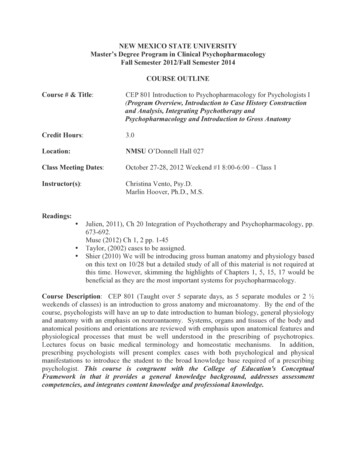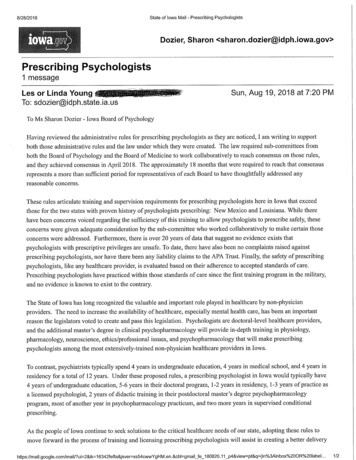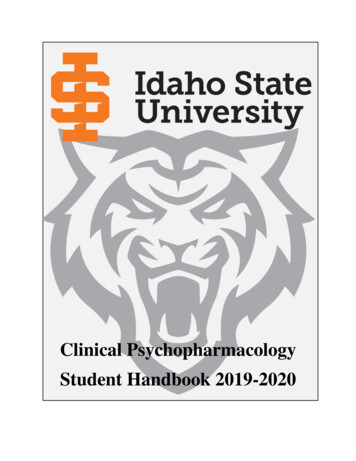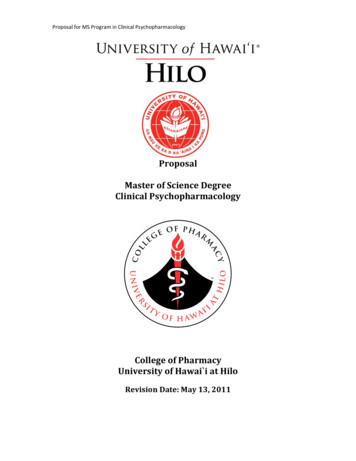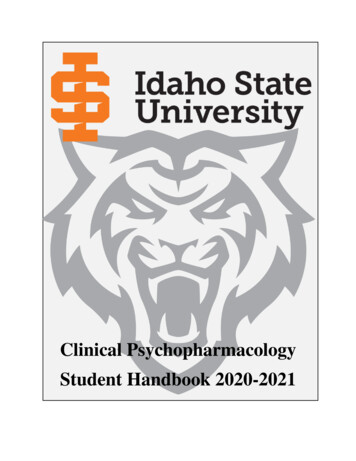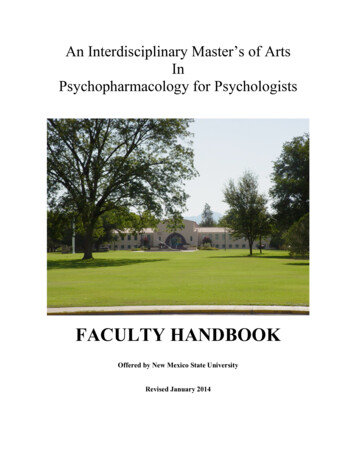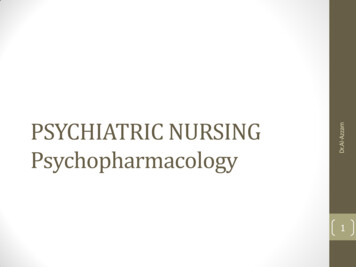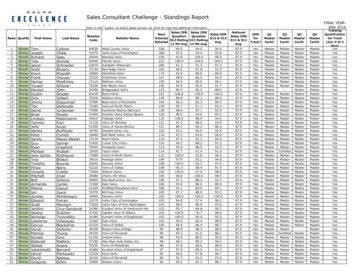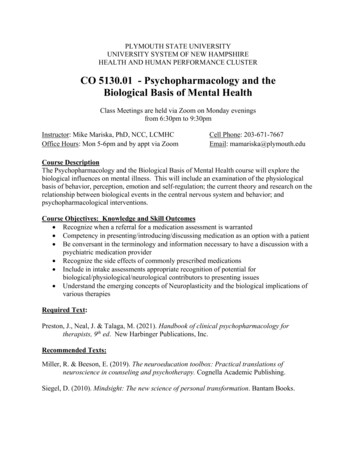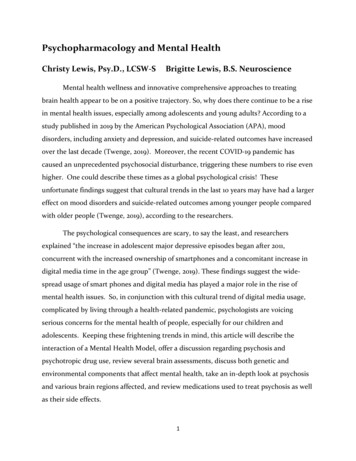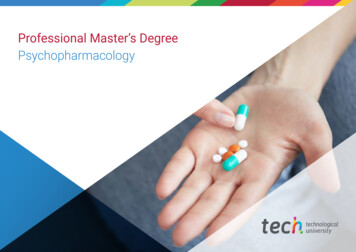
Transcription
Professional Master’s DegreePsychopharmacology
Professional Master’s DegreePsychopharmacologyCourse Modality: OnlineDuration: 12 monthsCertificate: TECH Technological UniversityOfficial Nº of hours: 1,500 h.Website: gree/master-psychopharmacology
Index0102IntroductionObjectivesp. 4p. 8030405SkillsCourse ManagementStructure and Contentp. 14p. 18p. 220607MethodologyCertificatep. 26p. 34
01IntroductionDue to the high overlap between psychiatric and medical pathologies, specialists mustbe updated on the specificities of psychopharmacology in all its areas. Students takingthis 100% online program will learn about the latest advances in the management ofpsychotropic drugs, available diagnostic methods, therapies and preventive measuresthat act precisely from the place where the conflict is generated, the mind. Throughoutthe program, the specialist will learn about the latest advances in Psychopharmacologyfrom professionals with years of experience. In this way, you will update your knowledgeand continue to perfect your diagnostic and treatment techniques.
Introduction 05A unique opportunity to learn fromthe best in a program that stands outfor the quality of its contents and itsinnovative teaching methodology"
06 IntroductionOver the course of the last decades, the statistics of people in need of psychotropicdrugs have increased. These figures are of concern to specialists, not only because ofthe seriousness they represent, but also because of their responsibility in the correctdiagnosis and treatment of the diseases that each individual develops. This programanalyzes disorders such as psychosis, dementia, eating problems and even difficultysleeping.The Professional Master's Degree covers the main current topics inPsychopharmacology in the medical field, such as pharmacological intervention inanxiety disorders and stress or drugs to treat pain. It is not, therefore, just another titlein the backpack, but a real learning tool to approach the topics of the specialty in amodern, objective way and with the capacity of judgment.In addition, as it is an online degree, the student is not conditioned by fixed schedules orthe need to move to another physical location. Using a device with Internet access, youcan access the content at any time of the day. In this way, you will be able to combineyour work and personal life with your academic life.This Professional Master's Degree in Psychopharmacology contains the mostcomplete and up-to-date scientific program on the market. The most importantfeatures include: The development of case studies presented by Psychopharmacology experts The graphic, schematic, and eminently practical contents with which they arecreated, provide scientific and practical information on the disciplines that areessential for professional practice Practical exercises where the self-assessment process can be carried out toimprove learning Its special emphasis on innovative methodologies Theoretical lessons, questions to the expert, debate forums on controversialtopics, and individual reflection assignments Content that is accessible from any fixed or portable device with an InternetconnectionTECH offers you a 100% onlinestudy opportunity that is ascomplete as possible and alwayslinked to current events"
Introduction 07This degree is the best investmentyou can make in selecting a refresherprogram to update your knowledgeof psychopharmaceuticals"You will delve into the differentmanifestations of anxiety, stress anddepression, and the most appropriatepsychotropic drugs for each case.Expand your knowledge thanksto the best didactic materialwith real clinical cases.The program’s teaching staff includes professionals from the sector who contributetheir work experience to this training program, as well as renowned specialists fromleading societies and prestigious universities.The multimedia content, developed with the latest educational technology, will providethe professional with situated and contextual learning, i.e., a simulated environment thatwill provide immersive training programmed to train in real situations.This program is designed around Problem-Based Learning, whereby the professionalmust try to solve the different professional practice situations that arise during theacademic year. For this purpose, the student will be assisted by an innovative interactivevideo system created by renowned and experienced experts.
02ObjectivesThe main objective of the program is the development of theoretical and practical learning,so that the physician is updated and works deeply in the most important concepts ofPsychopharmacology. In this way, the graduate achieves a comprehensive management ofthe patient through a complete program based on the latest information. TECH provides thespecialist with all the necessary tools that will guide them to achieve their own goals.
Objectives 09This Professional Master’s Degree will allow you toupdate your knowledge in Psychopharmacologywith the use of the latest educational technology, tocontribute with quality and safety to decision making"
10 ObjectivesGeneral objectives Manage the current knowledge of drugs used in psychiatry and neurology Train to achieve the therapist-patient-medication link Identify the absorption properties of medication Develop proficiency in pharmacodynamics Describe in protocols the intervention programs, taking into account thecharacteristics and specific aspects of medication taking Identify the evolution of the different disorders listed in the DSM-5 or ICD-10 Master the fields of medical-psychologist interaction in family intervention Train the professional on all the updated references on the diagnosis, interventionand therapeutic process in order to interact with the medication Describe with decision protocols the individualized study of family members toperform a rigorous psychopathological study Use decision trees to permanently perform differential diagnosis Frame all the information within a multidisciplinary framing model in the study ofthe biopsychosocial framework of the psychotherapy-pharmacology relationship
Objectives 11Specific objectivesModule 1. Pharmacology and Its Objectives in the PsychologicalTherapeutic Process Describe the Patient’s Clinical History Discover and promote the family psychic fabric Differentiate the different etiologies of mental disordersModule 3. Classification of Psychotropic Drugs Identify study methods to demonstrate that the drug has utility Discover the legal procedures for the use of the drug Describe the harmful links between drugs Manage and master the role of sympathy and empathy in vicarious learning Use knowledge about the side effects of drugs so that they do not hinder theintervention in psychotherapy Manifest the importance of admiration in the overall balance of the family Describe the beneficial effects of the drug Develop effective analysis plans for differential diagnosis Master the adverse effects and toxicity of the drug Identify psychopharmacological needs in mood disorders Manage the patient's clinical history, as well as provide the necessary skills to workin a multidisciplinary mannerModule 2. Anamnesis and the Decision to Choose the Appropriate Drug Discover and find the emotional memories of the components of the disorder Master and manage the relationship to become a referential person Identify the components of the patient's pathology to decide on intervention Point out the impact of diagnoses on patient decision making Design and implement chronic disease adjustment programs Develop protocols that do not allow for drug dependence Manage and stabilize the emotional and affective deficiencies of the patient withinthe intervention Use the intervention to determine when it is necessary for other professionals tojoin the analysis processModule 4. Pharmacological Intervention in Anxiety and Stress Disorders Differentiate the pharmacological casuistry for depression and anxiety disorders Identify and describe the possible management of anxiety disorders Assesses the impact of parental anxiety, depressive and psychotic disorders Express and identify the importance of stress Identify and differentiate anxiety disorders under their different headings Recognize and differentiate disorders secondary to stress
12 ObjectivesModule 5. Intervention with Psychotropic Drugs in Depression, EatingDisorders, and Sleep Disorders Describe depressive axes Master the interaction between antidepressants and other drugs Evaluate and list components of eating disorders Control pharmacotherapy for anorexia nervosa and master pharmacologicaltreatment of bulimia Handle sleep management with pharmacotherapy Differentiate sleep and wakefulness disorders Manage the dynamics of sleepwalking Differentiate night terror from nightmaresModule 6. Pharmacotherapy of Psychosis and Dementias Learn the side effects of medication for Alzheimer's disease Differentiate and frame the disorders of a psychotic systemic disorder Describe and master the clinic of schizophrenia according to the theory ofcommunication and double bind Perform and adapt pharmacological intervention protocols within aninterdisciplinary framework of psychosis Address the clinical use of medication in patients with dementia Develop the intervention with the drug according to the mental logic of the differentage groups Master and manage the differential characteristics of psychological pathologies
Objectives 13Module 7. Drugs Used in the Pain Unit Design and conduct controlled clinical studies in pain Mastering pain within the framework of therapy Managing acute pain with psychopharmaceuticals Master the assessment and intervention tools using all pain intervention indicators Develop follow-up models that express the changes of pathologies specific tomental states and pain Identify and master the clinical and prognostic features of the different disorders ofchildhood and adolescence with pharmacological intervention in painTake the step as a physician to getup to date on the latest developmentsin Psychopharmacology"
03SkillsAfter passing the program evaluations, the professional will have acquired theprofessional competencies necessary for a quality and updated practice based on themost innovative didactic methodology. This is because throughout the ProfessionalMaster's Degree you will face multiple simulated clinical cases, based on real patients inwhich you will have to investigate, establish hypotheses and, finally, resolve the situation.In addition, there is abundant scientific evidence on the efficacy of the method. In thisway, specialists learn better, faster and more sustainably over time.
Skills 15It delves into the most recommendedpsychotropic drugs to treat anxiety or panicdisorder, agoraphobia and social phobia"
16 SkillsGeneral skills Manage psychopathology to create a framework of safety in the diagnosis andsubsequent treatment with psychotropic drugs Master the relationship to achieve an adequate link to obtain the necessaryinformation for the diagnosis Connect with the family to locate the most relevant agents in their history and fromthere take their medical history Appreciate all the elements of communication in order to know not only what thefamily members say, but also what they feel and what they perceive Describe the different models that explain the state of the family in order to be ableto make decisions regarding the psychopathological situation Identify the different criteria that currently establish the expression of psychologicalillness in order to establish an adequate intervention with psychotropic drugs Describe and propose clinical expressions that, although not collated in diagnosticmanuals, are becoming common in everyday clinical practice Master the multidisciplinary relationship to help and assist with the knowledge ofother professionals and perform a psychopathological analysis according to thesystem's reality
Skills 17Specific skills Generate an adequate link to enable the psychopathological study Advocate and develop protocols that differentiate health from illness in the family Prepare and master the relationship in the first meeting with the child or adolescentand the adults that make up the family nucleus Discover the arsenal of signs and signals to identify the psychopathology of familymembers Describe the emotions felt by the subject in the face of treatment with psychotropicdrugs Know and be able to develop the role of technical consultant for cases, programs,organization, support to Unit and external professionals Manage and master the techniques of staging, rescue and outcome of theevaluation process Working in a multidisciplinary UTD and communicating adequately with theprofessionals who are part of it Develop ways to detect personality disorders: histrionic, dependent and avoidantDevelop and recognize the unique signs of passive aggressive personality disorder Prepare clinical reports and support other professionals in the reporting of painpatients Differentiate between the knowledge of DNA and RNA, in order to performdiagnostic differentiation in the family setting Coordinate with healthcare and non-healthcare professionals in the comprehensiveapproach to pain with continuity of care Describe the importance of epigenetics in the study of child and adolescentbehavior Describe little-known syndromes such as self-injury, in order to master them andmanage self-injury under emotional anxiety Break down and manage the DSM-5 and ICD-10 classification of mental illnesses Communicate and educate so that the proposed diagnoses lead to an effectivetherapeutic relationshipA unique specialization course thatwill enable you to acquire superiortraining for development in this field"
04Course ManagementThe program includes in its teaching staff reference specialists in Psychopharmacology,who bring to this training the experience of their work. Additionally, other recognizedspecialists participate in its design and preparation, which means that the program isdeveloped in an interdisciplinary manner. In this way, the student has the guaranteesrequired to specialize globally in a booming sector that will lead to professional success.
Course Management 19Learn from leading professionals thelatest advances in procedures in thefield of Psychopharmacology"
20 Course ManagementManagementDr. Aguado Romo, Roberto Psychologist specializing in Clinical Psychology European specialist in Psychotherapy from the EFPA President of the European Institute of Time-Limited Psychotherapy Director of the Evaluation and Psychotherapy Center of Talavera, Bilbao and Madrid Director of the scientific journal Psinapsis Master’s Degree in Clinical and Health Psychology by the Spanish Society of Psychosomatic Medicine and HealthPsychology. Tutor of the Basic Psychology course at the UNED
Course Management 21ProfessorsDr. De Dios González, AntonioDr. Martínez-Lorca, Manuela Director of the Psychology Department of the Hospital Quirón de Marbella, Spain Doctorate in Psychology from the University of Castilla-La Mancha Director of Avatar Psychologists Health Psychologist. Master in Time-Limited Psychotherapy and Health Psychology by the EuropeanInstitute of Time-Limited Psychotherapies. Lecturer in the Department of Psychology at the UCLM Transpersonal Therapist by the Spanish School of Transpersonal Development Master's degree in Neuro-Linguistic Programming (N.L.P.) by Richard Bandler'sSociety of Neuro-Linguistic Programming. Specialist in Clinical Hypnosis and RelaxationDr. González, Mónica Master in Time-Limited Psychotherapy and Health Psychology by the EuropeanInstitute of Time-Limited Psychotherapies. Specialist in Clinical Hypnosis and RelaxationDr. Roldán, Lucía Health Psychologist Cognitive-behavioral intervention specialist Psychologist in charge of the Department of Child and Adolescent Psychology atHospital Quirón Salud Marbella and Avatar Psicólogos. Master in Time-Limited Psychotherapy and Health Psychology by the EuropeanInstitute of Time-Limited Psychotherapies. Master's degree in Time-Limited Psychotherapy and Health Psychology by theEuropean Institute of Time-Limited Psychotherapy. Expert in energy therapy intervention University Specialist in Clinical Hypnosis with Selective Dissociation Focusing by theUniversity of Almeria. Collaborator in different Red Cross programs Professor on the Master’s Degree in Time-Limited Psychotherapy and HealthPsychology by the European Institute of Time-Limited Psychotherapy Trainer of Avatar Psicólogos in different programs of emotional managementfor educational centers and companies. Trainer at Human Resources ConsultingServices (HRCS)
05Structure and ContentThe structure of the contents has been designed by a team of professionals fromthe best educational centers and universities in the country, aware of the currentrelevance of innovative teaching, and committed to quality training through neweducational technologies.
Structure and Content 23A comprehensive teaching program, structured inwell-developed teaching units, oriented towardsefficient and swift learning that is compatible withyour personal and professional life”
24 Structure and ContentModule 1. Pharmacology and Its Objectives in the PsychologicalTherapeutic Process2.16. A Gesture is Worth a Thousand Words2.17. Medical History.2.18. General Structure of the Mental Examination1.1.Anthropological, Historical, Sociological and Psychological Perspective of DrugUtilization1.2.Objectives of Pharmacology1.3.Concept of Pharmacology2.21. Some Special Types of Clinical Interviews1.4.Therapeutic Pharmacology1.5.PharmacodynamicsModule 3. Classification of Psychotropic Drugs1.6.Pharmacokinetics1.7.Plasma Level Curve1.8.Toxicology1.9.Social Aspects of the Drug1.10. Medication Intervention Process1.11. Information form for the Patient Who Is Going to Receive PsychopharmacologicalTreatment1.12. Process for a Drug to Become Legal1.13. Symptoms and Signs, Diseases and SyndromesModule 2. Anamnesis and the Decision to Choose the Appropriate Drug2.19. Semiology2.20. Epistemology of Diagnosis3.1.Neurophysiological Bases of Mental Illness and its Treatment3.2.Antipsychotics and Neuroleptics3.3.Anxiolytics and Sedatives3.4.Antidepressants3.5.Antimanic or Euthymic Drugs3.6.Antiseizure Drugs3.7.Medications for Agitation3.8.Pharmacotherapy of Confusion3.9.Drugs for Dementia3.10. Anti-Deficiency DrugsModule 4. Pharmacological Intervention for Anxiety and StressDisorders and Stress2.1.The interview in a Clinical and Expertise Setting2.2.Information Theory2.3.Communication Channels4.1.Anxiety or Panic Disorder2.4.Communication System4.2.Agoraphobia2.5.Axioms of the Interview4.3.Social Phobia2.6.It is Impossible Not To Communicate4.4.Specific Phobias2.7.Content and Relationship4.5.Generalized Anxiety Disorder2.8.Affective Value4.6.Obsessive Compulsive Disorder and Related Disorders2.9.Digital and Analog Communication4.7.Separation Anxiety Disorder2.10. Symmetry and Asymmetry4.8.Adaptive Disorder2.11. Exploring Communication4.9.Dissociative Disorders2.12. Verbal Communication4.10. Somatic Symptom Disorders and Associated Disorders2.13. Non-Verbal Communication4.11. Trauma and Stress Related Disorders2.14. Double Bond4.12. Post-Traumatic Stress2.15. Psychopathology of Communication4.13. Disinhibited Social Relationship Disorder
Structure and Content 25Module 5. Intervention with Psychotropic Drugs in Depression, EatingDisorders, and Sleep Disorders5.1.Disruptive Mood Dysregulation Disorder5.2.Major Depressive Disorder5.3.Persistent Depressive Disorder (Dysthymia)5.4.Premenstrual Dysphoric Disorder5.5.Substance-Induced Depressive Disorder5.6.Pica5.7.Rumination Disorder5.8.Food Avoidance Disorder5.9.Anorexia Nervosa5.10. Bulimia Nervosa5.11. Binge Eating Disorder5.12. Insomnia5.13. Hypersomnia5.14. Narcolepsy5.15. Obstructive Sleep Apnea5.16. Sleep-Related Hyperventilation6.11. Dementia Due to Brain Trauma6.12. Vascular Dementia6.13. Dementia Due to Parkinson's Disease6.14. Dementia Due to Huntington's Disease6.15. Personality Disorders6.16. LatrogeniaModule 7. Drugs Used in the Pain Unit7.1.Medical History of the Patient with Pain7.2.Psychosocial Approach to Chronic Pain7.3.Patient-Controlled Analgesia (PCA)7.4.Pain in Polytrauma Patients7.5.Pain in Severe Burns7.6.Headaches and Facial Pain7.7.Treatment of Neuralgias7.8.Treatment of Oncologic Pain7.9.Pain and Terminal Sedation7.10. Fibromyalgia5.17. Non-REM Sleep Awakening Disorders5.18. Nightmare Disorder5.19. Restless Leg SyndromeModule 6. Pharmacotherapy of Psychosis and Dementias6.1.Schizophrenia and Schizophreniform Psychoses6.2.Delusional Disorder6.3.Brief Psychotic Disorder6.4.Substance-Induced Psychotic Disorder6.5.Catatonia6.6.Bipolar Disorder6.7.Cyclothymic Disorder6.8.Delirium6.9.Alzheimers Disease6.10. Frontotemporal Lobe DegenerationA unique, key and decisivestudy experience to boost yourprofessional development"
06MethodologyThis training program provides you with a different way of learning. Our methodologyuses a cyclical learning approach: Relearning.This teaching system is used, for example, in the most prestigious medical schools inthe world, and major publications such as the New England Journal of Medicine haveconsidered it to be one of the most effective.
Methodology 27Discover Relearning, a system that abandonsconventional linear learning, to take you throughcyclical teaching systems: a way of learning thathas proven to be extremely effective, especiallyin subjects that require memorization"
28 MethodologyAt TECH we use the Case MethodWhat should a professional do in a given situation? Throughout the program, studentswill face multiple simulated clinical cases, based on real patients, in which they will haveto do research, establish hypotheses, and ultimately resolve the situation. There is anabundance of scientific evidence on the effectiveness of the method. Specialists learnbetter, faster, and more sustainably over time.With TECH you will experience a wayof learning that is shaking the foundationsof traditional universities around the world.According to Dr. Gérvas, the clinical case is the annotated presentation of a patient, orgroup of patients, which becomes a "case", an example or model that illustrates somepeculiar clinical component, either because of its teaching power or because of itsuniqueness or rarity. It is essential that the case is based on current professional life,trying to recreate the real conditions in the physician's professional practice.
Methodology 29Did you know that this method was developedin 1912, at Harvard, for law students? The casemethod consisted of presenting students withreal-life, complex situations for them to makedecisions and justify their decisions on how tosolve them. In 1924, Harvard adopted it as astandard teaching method”The effectiveness of the method is justified by four fundamental achievements:1. Students who follow this method not only achieve the assimilation ofconcepts, but also a development of their mental capacity, throughexercises that evaluate real situations and the application of knowledge.2. Learning is solidly translated into practical skills that allow the student tobetter integrate into the real world.3. Ideas and concepts are understood more efficiently, given that the examplesituations are based on real-life.4. Students like to feel that the effort they put into their studies is worthwhile.This then translates into a greater interest in learning and more timededicated to working on the course.
30 MethodologyRelearning MethodologyAt TECH we enhance the Harvard case method with the best100% online teaching methodology available: Relearning.This university is the first in the world to combine the study of clinicalcases with a 100% online learning system based on repetition,combining a minimum of 8 different elements in each lesson, a realrevolution with respect to the mere study and analysis of cases.Professionals will learn throughreal cases and by resolvingcomplex situations in simulatedlearning environments. Thesesimulations are developed usingstate-of-the-art software tofacilitate immersive learning.
Methodology 31At the forefront of world teaching, the Relearning method has managed to improvethe overall satisfaction levels of professionals who complete their studies, withrespect to the quality indicators of the best online university (Columbia University).With this methodology, more than 250.000 physicians have been trained withunprecedented success in all clinical specialties regardless of surgical load. Ourpedagogical methodology is developed in a highly competitive environment, with auniversity student body with a strong socioeconomic profile and an average age of43.5 years old.Relearning will allow you to learn with less effortand better performance, involving you more inyour specialization, developing a critical mindset,defending arguments, and contrasting opinions:a direct equation to success.In our program, learning is not a linear process, but rather a spiral (learn, unlearn,forget, and re-learn). Therefore, we combine each of these elements concentrically.The overall score obtained by TECH's learning system is 8.01, according to thehighest international standards.
32 MethodologyThis program offers the best educational material, prepared with professionals in mind:20%Study MaterialAll teaching material is produced by the specialists who teach the course, specificallyfor the course, so that the teaching content is highly specific and precise.These contents are then applied to the audiovisual format, to create the TECH onlineworking method. All this, with the latest techniques that offer high quality pieces ineach and every one of the materials that are made available to the student.Surgical Techniques and Procedures on VideoTECH introduces students to the latest techniques, the latest educational advancesand to the forefront of current medical techniques. All of this in direct contact withstudents and explained in detail so as to aid their assimilation and understanding.And best of all, you can watch the videos as many times as you like.15%Interactive SummariesThe TECH team presents the contents attractively and dynamically in multimedialessons that include audio, videos, images, diagrams, and concept maps in orderto reinforce knowledge.This exclusive multimedia content presentation training Exclusive system wasawarded by Microsoft as a "European Success Story".Additional ReadingRecent articles, consensus documents and international guidelines, among others.In TECH's virtual library, students will have access to everything they need tocomplete their course.15%3%
Methodology 33Expert-Led Case Studies and Case Analysis20%Effective learning ought to be contextual. Therefore, TECH presents real casesin which the expert will guide students, focusing on and solving the differentsituations: a clear and direct way to achieve the highest degree of understanding.Testing & RetestingWe periodically evaluate and re-evaluate students’ knowledge throughout theprogram, through assessment and self-assessment activities and exercises: sothat they can see how they are achieving your goals.17%ClassesThere is scientific evidence on the usefulness of learning by observing experts:The system termed Learning from an Expert strengthens knowledge and recallcapacity, and generates confidence in the face of difficult decisions in the future.3%7%Quick Action GuidesTECH offers the most relevant contents of the course in the form of worksheetsor quick action guides. A synthetic, practical, and effective way to help studentsprogress in their learning.
07CertificateThe Professional Master's Degree in Psychopharmacology guarantees you, in additionto the most rigorous and updated training, access to a Professional Master's Degreeissued by TECH Technological University.
Certificate 35Successfully complete this training andreceive your university degree withouttravel or laborious paperwork”
36 CertificateThis Professional Master's Degree in Psychopharmacology contains the mostcomplete and updated scientific program on the market.After the student has passed the evaluations, they will receive their correspondingProfessional Master’s Degree issued by TECH Technological University by trackeddelivery*.The diploma issued by TECH Technological University will reflect the qualificationobtained in the Professional Master's Degree, and meets the requirements commonlydemanded by job exchanges, competitive examinations and professional careerevaluation committees.Title: Professional Master's Degree in PsychopharmacologyOfficial Nº of hours: 1,500 h.*Apostille Convention. In the event that the student wishes to have their paper diploma issued with an apostille, TECH EDUCATION will make the necessary arrangements to obtain it, at an additional cost.
Professional Master’s DegreePsychopharmacologyCourse Modality: OnlineDuration: 12 monthsCertificate: TECH Technological UniversityOfficial Nº of hours: 1,500 h.
Professional Master’s DegreePsychopharmacology
This Professional Master's Degree in Psychopharmacology contains the most complete and up-to-date scientific program on the market. The most important features include: The development of case studies presented by Psychopharmacology experts The graphic, schematic, and eminently practical contents with which they are
